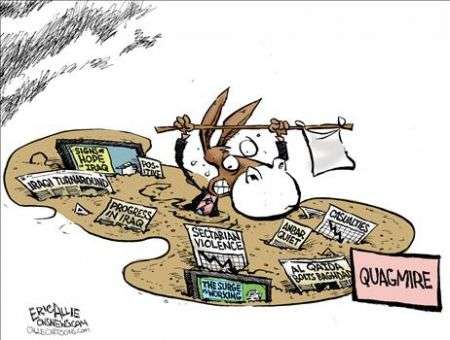Carl at Simply Left Behind (which is a lefty blog) is opining on what’s wrong with us nowadays and sounding…very conservative…
You get hit by a car. You sue the other driver. He hires a lawyer and sues you back to try to prove that, indeed, it was your fault for stepping in front of his car.
:
You see a woman in an emergency room collapse. She lays there for 24 hours and dies. No one does a thing. Why? Because someone else should have handled it.
You walk down a street and a piece of newspaper blows across and wraps around your ankle. You stand next to a garbage can, yet rather than reach down, pluck the paper and toss it in the bin, you shake your foot and off it flies to litter again. Serial litter, I like to call this.
We fight a war in a far-off land, and the only sacrifice we’re asked to make is to load up on debt and shop some more. Arguably, given what has happened, this might turn into the ultimate sacrifice for many of us, but that’s a different story.
And I would add to that, the story of Sergio Casian Aguiar curb-stomping his own son to death for a full seven minutes. While bystanders watched.
A spectacle that shocked and horrified conservatives, while liberals made excuses:
“I would not condemn these people,” said John Darley, a professor of psychology and public affairs at Princeton University who has studied how bystanders react in emergency situations. “Ordinary people aren’t going to tackle a psychotic.
“What we have here,” Darley said, “is a group of family and friends who are not pre-organized to deal with this stuff. They don’t know who should do what. … If you had five volunteer firefighters pull up, you would expect them to have planned responses and a division of labor. But that’s not what we had here.”
Carl’s cognitive dissonance on the virtue of sacrifice is a source of endless fascination to me, in part because he represents so many millions besides himself. And while parts of his thesis make sense, together as a whole it is a baffling tangled mess of contradictions.
When the newspaper attaches itself to your ankle you’re supposed to bend down, pick it up, and throw it away!
Okay, with Saddam Hussein that is exactly what we did. Carl doesn’t like that…
But it makes sense! Because there was no sacrifice!
Yeah, well, we sacrificed plenty. That’s the point of all these war protests…supposedly we’re drafting our innocent doe-eyed children, boxing ’em up, hauling ’em to Iraq where they get blown up by the thousands. And that’s wrong! But that’s a sacrifice if ever there was one. So…your point?
It’s only the sacrifice of a few! It doesn’t affect everyone, so it doesn’t count!
We-ell, as I pointed out in my comment, in a lot of other areas a financial sacrifice is supposed to count, and supposedly, the Iraq war is responsible for crude oil that costs $149 a barrel. When we pull in to a gas station and have to part with $50 to fill a twelve-gallon tank, that seems to me to be a sacrifice, especially when by Tuesday of next week we’ll have to do it again.
Unless financial sacrifices don’t count, in which case Carl just nullified every speech made by every tax-and-spend liberal who ever wanted to “roll back the Bush tax cuts” for the virtue of sacrifice.
I think liberals like Carl are confused on the concept of sacrifice. There are two definitions to it: There is the outcome-based sacrifice, in which the “sacrifice” itself is just a negligible and unpleasant side effect in the process of upholding what truly matters. The narrower definition, in which the pain is the point, is what John Galt was talking about in that monstrously long speech of his:
Sacrifice is the surrender of value — of a higher value to a lower one, or of the good to the evil.
The code is impossible to practice because it would lead to death, and thus moral perfection is impossible to man.
The Doctrine of Sacrifice cannot provide man with an interest in being good.
Since man is in fact an indivisible unity of matter and consciousness, the sacrifice of “merely” material values necessarily means the sacrifice of spiritual ones.
The self is the mind, and the most selfish act is the exercise of one’s independent judgment. In attacking selfishness, the Doctrine of Sacrifice seeks to make you surrender your mind.
The Doctrine of Sacrifice commands that you act for the good of others but provides no standard of the good. And it requires only that you intend to benefit others, not that you succeed.
The Doctrine of Sacrifice makes you the servant and others your masters –and adds insult to injury by saying you should find happiness through sacrifice.
Somewhere in there Galt made a mention of the mother who went without eating so that her infant could eat; that would not be a sacrifice, according to Galt who was using the pain-based definition of “sacrifice.” That mother would be upholding an ideal important to her system of values, simply paying a price necessary to acquire it. Sacrifice, Galt said, would have been giving up her child for the sake of something not important to her. (Update: It actually had to do with sacrificing the child for a nice hat. See below. My memory managed to “sacrifice” the finer details to retain the overall picture; cut me some slack, it’s a freakin’ thirty-five thousand word speech.) That is what is meant by surrender “of a higher value to a lower one.” It entails a net loss, because the pain is the point of the exercise.
My thinking is, the people who agree with Carl, also agree with John Galt. Sacrifice is not about principles. Sacrifice is identifying what is important to you, and then getting rid of it.
Our liberals do not feel the conflict of this dissonance when they talk about raising taxes on rich people. Money is supposed to be important to rich people, right? And so we force them to get rid of it through higher taxes. When we talk about meeting the objectives, we already begin the process of losing the interest of our liberals; their eyes glaze over, and they yearn to spend their precious moments on a rerun of The Daily Show or watching another one of Keith Olbermann’s recycled rants. But we complete that process of alienating them when we talk about meeting the objectives through private charities.
This is because in the more specific, liberal-and-Galt definition of “sacrifice,” private charities don’t meet the criteria. They are voluntary. The donors are exchanging an inferior value, which is the cash that is donated, for a greater one which is the beneficial effect of the charity. They choose this. In so doing, they are upholding their own systems of belief and therefore are not “sacrificing.”
I suspect that is the real reason why so many of our liberals can hold their protests about the latest handy round body-count in our “illegal and unjust war,” on the one hand — and on the other, decry the lack of “sacrifice” that has been made in the war. Real people like you and me who have red blood in our veins and are from Planet Earth, look at that and say “how can you protest both?” The answer to that is easy.
Liberals are like the girlfriend who is unhappy with her engagement ring if the prospective groom still has money left after he bought it — the size of the ring isn’t the point, how good it looks isn’t the point, how much did it cost isn’t really the point; the point is, did it cost enough that it hurt him.
This is why their ideas are unfit for implementation in the real world. Out here, if you have a job to do, and you get it done but it didn’t cause you pain, that’s a success. If it was such a painful experience that it injured you, it’s still a failure if you didn’t meet the stated objectives. Reality says it’s all about getting the job done, not what you give up to do it. Our liberals don’t agree. They think, if you’re suitably diminished that you can’t do anything else, and your intentions were noble, then that’s all that matters. Whether the job got done, is just a side bunny-trail to them.
This is provable. Saddam Hussein is that newspaper flying about the ankles if ever there was one. One President kicked him aside to be blown further down the sidewalk, and another President picked him up and stuck him in the trash bin. Our liberals are furious at the President who chucked him in the trash bin. They won’t say why.
Update: John Galt’s comments on sacrifice, whittled down to the bare bone, heavily edited from the state in which they exist starting on p. 940:
The word that has destroyed you is ‘sacrifice.’ Use the last of your strength to understand its meaning. You’re still alive. You have a chance.
‘Sacrifice’ does not mean the rejection of the worthless, but of the precious. ‘Sacrifice’ does not mean the rejection of the evil for the sake of the good, but of the good for the sake of the evil. ‘Sacrifice’ is the surrender of that which you value in favor of that which you don’t.
:
If you give money to help a friend, it is not a sacrifice; if you give it to a worthless stranger, it is. If you give your friend a sum you can afford, it is not a sacrifice; if you give him money at the cost of your own discomfort, it is only a partial virtue, according to this sort of moral standard; if you give him money at the cost of disaster to yourself – that is the virtue of sacrifice in full.
:
A sacrifice is the surrender of a value. Full sacrifice is full surrender of all values. If you start, however, as a passionless blank, as a vegetable seeking to be eaten, with no values to reject and no wishes to renounce, you will not win the crown of sacrifice. It is not a sacrifice to renounce the unwanted…
:
If you wish to save the last of your dignity, do not call your best actions a ‘sacrifice’: that term brands you as immoral. If a mother buys food for her hungry child rather than a hat for herself, it is not a sacrifice: she values the child higher than the hat; but it is a sacrifice to the kind of mother whose higher value is the hat, who would prefer her child to starve and feeds him only from a sense of duty.
:
Sacrifice could be proper only for those who have nothing to sacrifice – no values, no standards, no judgment – those whose desires are irrational whims, blindly conceived and lightly surrendered. For a man of moral stature, whose desires are born of rational values, sacrifice is the surrender of the right to the wrong, of the good to the evil.
The creed of sacrifice is a morality for the immoral – a morality that declares its won bankruptcy by confessing that it can’t impart to men any personal stake in virtues or values, and that their souls are sewers of depravity, which they must be taught to sacrifice. By its own confession, it is impotent to teach men to be good and can only subject them to constant punishment. [emphasis mine]
Now, I have not heard a single lefty-leaning Bush-bashing blue-blooder — not once! — seek to assert that the war in Iraq, oh dear if only it entailed “sacrifice” from us all the way that noble effort by FDR that was World War II demanded rationing of rubber, steel, wood, et al…why, then the War On Terror would be an equally heroic deed and then they’d be able to get behind it. I have not heard ’em say that one single time.
But I’ve heard ’em, many-a-time, throw out some platitudes designed to bully the casual thinker into believing that’s where they were coming from. That glittery, glistening heroic sheen of “sacrifice,” yesiree! That’s what Bush’s unjust and immoral war is missing. We aren’t sacrificing enough!
But John Galt’s words put that into a whole different light, don’t they. ‘Sacrifice’ is the surrender of that which you value in favor of that which you don’t. It is therefore morality for the immoral; it is a moral code for those who cannot appreciate having one.
Not that asphalt rationing would bring any of these nattering nabobs on board. It wouldn’t. If you parse Carl’s words very carefully, and listen to the other nattering nabobs very carefully, you’ll see they are promising no such thing. The universality of our sacrifices has nothing to do with it — the country is engaged in an intensive effort, there’s still a Republican in the White House, and that is all it takes to inspire their impassioned opposition to what we’re doing.
All the bitching about “sacrifice” is just a red herring — and that’s the best part about it.










 Barack Obama has a bracelet, too.
Barack Obama has a bracelet, too.

 Speaking of Gerard, he’s taking apart
Speaking of Gerard, he’s taking apart  The kollege kids in Ithaca, NY want a Guiness representative to validate their claim to the largest human peace sign.
The kollege kids in Ithaca, NY want a Guiness representative to validate their claim to the largest human peace sign.
 Yeah sure, McCain really really cares about the country’s national security, you can tell by his plan to close GITMO because after all, closing GITMO and bringing terrorists here into the United States prison system will do so much for the country’s national security. Sure, why not give these hardened and experienced terrorists a captive audience made up of angry, violent, hate-filled American citizens and the opportunity to recruit and train and initiate them into Jihad. It will only make us safer, right?
Yeah sure, McCain really really cares about the country’s national security, you can tell by his plan to close GITMO because after all, closing GITMO and bringing terrorists here into the United States prison system will do so much for the country’s national security. Sure, why not give these hardened and experienced terrorists a captive audience made up of angry, violent, hate-filled American citizens and the opportunity to recruit and train and initiate them into Jihad. It will only make us safer, right?
 Heard it on the radio yesterday morning, I knew I’d heard it before, and used my Madd Googel Skilz to
Heard it on the radio yesterday morning, I knew I’d heard it before, and used my Madd Googel Skilz to 